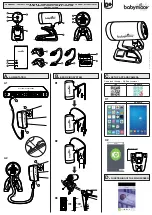
8
E
Connecting Peripheral Equipment
■ Connection when the PN-ZB02 (optional)
is attached
The PN-ZB02 expansion board (optional) allows the use of
additional connection terminals.
8. PC/AV DVI-D input terminal
• Set DVI of INPUT SELECT on the OPTION menu
according to the device to be connected.
• Select the audio input terminal to be used in PC DVI-D or
AV DVI-D of AUDIO SELECT on the OPTION menu.
9. PC/AV DVI-D output terminal
• The video of the PC/AV DVI-D input can be output to an
external device.
• Outputting HDCP-encrypted video requires an external
device which supports HDCP.
• This terminal allows the daisy chain connection of up to 5 monitors.
TIPS
• The length of the signal cables or surrounding environment
may affect the image quality.
• The screen may not display properly when using terminals
other than PC DVI-D/AV DVI-D for the input mode. In this
case, turn off the power to all the monitors connected in a
daisy chain and then turn the power on again.
• When connecting monitors in a daisy chain set AUTO
INPUT CHANGE to OFF.
• Video output is disabled in the following cases:
When the input mode is PC HDMI/AV HDMI
When PIP SOURCE of the PIP/PbyP menu is set to PC
HDMI or AV HDMI
When the power is turned off
When the monitor is in input signal waiting mode
10. LAN terminal
• You can control the monitor from a PC on a network by
connecting a commercially available LAN cable between
this terminal and a network.
11. External speaker terminals
• Be sure to use external speakers with an impedance of 6 Ω
or greater and a rated input of at least 10 W.
3
2
1
Approx.
3-15/16 inch
(10 cm)
1. Attach a speaker cable core (included with the PN-ZB02) to
the end of the speaker cable connected to the monitor.
2. While pushing the tab, insert the tip of the cable.
3. Release the tab.
TIPS
• Be sure to connect the + and - terminals and the left and
right speakers properly.
• Avoid short circuiting the + and - terminals.
12. Audio1 input terminals
13. Audio2 input terminals
• Set the audio input terminal to be used in each input
mode in AUDIO SELECT on the OPTION menu.
14. PC RGB input terminals
• Set BNC of INPUT SELECT on the OPTION menu to PC
RGB when using the PC RGB input terminals.
• Select the audio input terminal to be used in PC RGB of
AUDIO SELECT on the OPTION menu.
15. AV component input terminals
• Set BNC of INPUT SELECT on the OPTION menu to AV
COMPONENT when using the AV component input terminals.
• Select the audio input terminal to be used in AV
COMPONENT of AUDIO SELECT on the OPTION menu.
16. AV video input terminal
• Select the audio input terminal to be used in AV VIDEO of
AUDIO SELECT on the OPTION menu.
17. AV S-video input terminal
• Select the audio input terminal to be used in AV S-VIDEO
of AUDIO SELECT on the OPTION menu.
Multiple monitor connection
The monitors can be aligned and used as a large screen.
[Example]
Second monitor
Secondary
(Expansion unit)
ID No.: 2
Third monitor
Secondary
(Expansion unit)
ID No.: 3
First monitor
Primary
(Main unit)
ID No.: 1
Fourth monitor
Secondary
(Expansion unit)
ID No.: 4
Remote control sensor box
(Supplied with the PN-ZR01)
TIPS
• Connect the RS-232C cables in order, starting with the first
monitor (primary monitor). If monitors are connected in a
different order they may not be operable.
• Always install the remote control sensor box on the primary
monitor.
■ Connection with video cable
May vary depending on the system being used.
If using the PC/AV DVI-D terminal, up to 5 monitors can be
connected in a daisy chain. (When the PN-ZB02 is attached)
shows the
signal flow
PC/AV DVI-D
input terminal
First monitor
Second monitor
PC/AV DVI-D
output terminal
PC/AV DVI-D
input terminal
Digital signal (DVI) cables
(commercially available)
To PC digital RGB output terminal











































